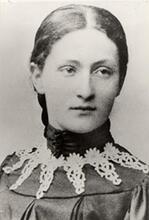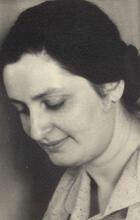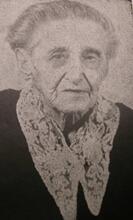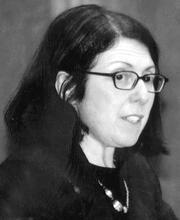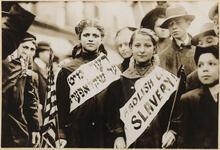Alice Hildegard Shalvi
After earning degrees in literature and social work in England, Alice Shalvi made Aliyah in 1949 and began teaching at Hebrew University. Beginning in 1969, she led efforts to create an English department at Ben-Gurion University; when she was denied the deanship because she was a woman, she mobilized female faculty members to protest their unfair treatment. In 1975, Shalvi began running the Pelech School for Haredi Girls, earning the Ministry of Education’s Education Prize in 1991 for such feminist initiatives as teaching Talmud to girls and insisting alumnae serve in either the IDF or the National Service. As founding chair of the Israeli Women’s Network, she made significant strides for women’s rights, such as ensuring women’s participation in every branch of the IDF and encouraging more women to run for office. In 2007, Shalvi won the Israel Prize. Her memoir, Never a Native, won a National Jewish Book Award in 2019.
“You’ve got to have a dream./If you don’t have a dream/How’re you going to have your dream come true?” These lines from Rogers and Hammerstein’s South Pacific, with which Paula Weiman-Kelman chose to end her film portrait of Professor Alice Shalvi, Rites of Passage (1997), provide an apt epigraph for the life of one of Israel’s leading feminists, a pioneer in the area of women’s education and women’s status in general.
Family and Education
Shalvi was born in Essen, Germany, on October 16, 1926, the youngest of the three children of Benzion (1890–1955) and Perl (1893–1962) Margulies, who were first cousins. Benzion was an open-minded, modern Orthodox Jew and a devout Zionist. Born in Skalat, Galicia, in 1890, one of the nine children (six sons, three daughters) of Mordecai and Feige (née Kesten) Margulies, he was an autodidact, well versed in Jewish and secular literature, fluent in Polish, Yiddish, Hebrew, German, and, eventually, also English. He studied commerce and bookkeeping at commercial colleges in Vienna and in Eger, Hungary, before immigrating to Germany. By the time World War I broke out in 1914, his parents and all his siblings had moved to Mannheim, where he and several of his five brothers engaged in wholesale merchandising. Together with all but the youngest of his brothers, he served in the Austro-Hungarian army. In contrast, Perl’s family had remained in Huyzhatyn, Galicia, where her father, Ze’ev (Welwel) was a hasid of the town’s rebbe and her mother kept a grocery store. The three daughters studied at a German-language school, while the sons received a traditional Jewish education. Living on the border of Russia and Austria, the family suffered severely during the war, in the course of which both Welwel and one of the daughters, Sarah, died. The youngest son, Avraham, an avowed communist, had emigrated to Russia to participate in the revolution. There he was later joined by the oldest daughter, Rebecca. Another brother, Lazl (Elazar) was killed by the Germans in World War II.
Benzion was taken prisoner by the Russians in 1916. On his return to Mannheim, he married Perl Margulies in August 1920. Their son Ze’ev (William) was born in June 1921 and a daughter, Edith, in 1923 (died 1929). Alice was born in 1926. All three of the children attended the Jewish elementary school in Essen, where several of the Margulies brothers had moved in the early 1920s.
In Essen Benzion was active both in the community of Jews from Eastern Europe and in the religious-Zionist Mizrachi movement. A delegate to Zionist Congresses in the 1930s, he was elected a member of the WZO Actions Committee after World War II. It was in all likelihood because of his public activities in the Jewish community that the family’s home was searched soon after the Nazis came to power. In August 1933 Benzion traveled to London, joining his youngest brother, Alexander, who had lived there since 1931 and had opened a small wholesale business in imported clocks and watches. Their mother also immigrated to the U.K. early in 1933, but it took several months before Benzion was able to obtain the entrance visas that enabled Perl, her mother, and the two children to leave Germany. They arrived in London in May 1934, only four days before William’s Lit. "son of the commandment." A boy who has reached legal-religious maturity and is now obligated to fulfill the commandmentsbar mitzvah.
Both children, William and Alice, continued their education in England. The young Alice, who soon excelled in English, was a voracious reader. Unlike her brother, who completed his studies at the Jewish Secondary School, Alice attended state schools but received private lessons in Hebrew and imbibed her Jewish knowledge from her home environment and its practices. In later life she would say that her parents instilled in her practical A biblical or rabbinic commandment; also, a good deed.mitzvot (commandments) such as Lit. "righteousness" or "justice." Charityzedakah (charity) and hakhnassat orhim (hospitality) by setting an example, rather than by preaching. She was profoundly influenced by her father’s energetic involvement in Jewish and Zionist communal affairs, which made the family home one in which leaders of the Jewish community from all over the world were often guests at the SabbathShabbat or holiday table. During World War II Benzion’s activities on behalf of refugees from war-torn Europe acquainted her with a number of artists and writers whom he supported, including the Yiddish poet Itzik Manger and the artist Mané Katz. It was surely not by chance that Shalvi’s earliest career choice was philanthropy, which she thought was a profession.
During World War II the family lived in Waddesdon, Buckinghamshire, and Shalvi completed her schooling at the Aylesbury Grammar School, from which in 1944 she gained entrance to Newnham College, Cambridge—one of only two colleges of the university at which women could then study. She received her B.A. degree in English literature but also followed in the activist footsteps of her father and brother (who studied at the London School of Economics while it was evacuated to Cambridge). She served in various capacities—secretary, treasurer, and president—of the Cambridge University Jewish Society, which, unusually, ran the city’s synagogue. Here she made history by successfully moving that women be permitted to lead the singing of zemirot (table hymns) after the society’s weekly Friday night Sabbath-eve suppers and by being the first woman invited to do so.
Aliyah
At Cambridge, in the summer of 1946, Shalvi encountered for the first time a group of teenage D.P.s (Displaced Persons, as Holocaust survivors were then known)—an encounter that profoundly shocked her and led her, just prior to her last year at Newnham, to decide to study social work in order to have a suitable profession once she arrived in Palestine. Her dream of Lit. "ascent." A "calling up" to the Torah during its reading in the synagogue.aliyah had been prompted not only by her immediate family’s involvement in Zionist affairs, but also by her admiration for those of her cousins who—like most members of her father’s family—had gone from Germany to Palestine and had been among the founding members of their respective A voluntary collective community, mainly agricultural, in which there is no private wealth and which is responsible for all the needs of its members and their families.kibbutzim. She was further inspired by the first post-war Zionist Congress, held in Basel in December 1946, to which her father was a delegate and which she attended as representative of the UK Inter-University Jewish Federation at the Youth Congress held simultaneously. Here she was privileged to hear the great leaders of Zionism, including Chaim Weizmann, Nahum Goldman, and David Ben-Gurion. A further stimulus was her first visit to Palestine with her parents in December 1947, soon after the UN decision on the establishment of a Jewish state. Excited by the vitality of the people and the beauty of the country, she was also greatly moved by the renewed encounter with her family and particularly with the kibbutz cousins. Though she wanted to stay on, she was urged by professionals whom she met to return to London and complete the studies she had just begun for a post-graduate diploma in social work at the London School of Economics. During her two years at the London School of Economics she made many friends among the considerable number of Jewish Palestinian students who had arrived after World War II. These, too, became frequent guests at her parents’ home.
In November 1949 she traveled by boat from Italy to Israel, her brother accompanying her as far as Naples. After a preliminary few weeks staying with an aunt in Tel Aviv, she moved to Jerusalem, which has ever since been her home.
Academic Career
Unfortunately, she soon discovered that social workers did not serve the post-Holocaust immigrants but rather assisted in the absorption of the mass immigration from the Arab countries, who were arriving in droves and being housed in ma’abarot (transit camps). Though conversant in English, German, French, and, to some extent, Yiddish, her ignorance of any Arabic dialect made it impossible to find employment in the field for which she had trained. By chance she learned that the Hebrew University, which had reopened in November 1949 after its enforced closure during the War of Independence, needed teachers of English as a Foreign Language for the American-style B.A. degree it had just introduced. Lacking other options, Shalvi—who had never considered teaching as a vocation—applied for a position and was accepted, beginning what proved to be a highly successful forty-year career in the university’s Department of English. Encouraged by the head of the department, A. A. Mendilow, she proceeded to a Ph.D. (her thesis topic was “Renaissance Concepts of Honour in Shakespeare’s ‘Problem’ Plays,” 1962) and rose to the rank of Assistant Professor before taking early retirement in 1990.
In May 1950, she met Moshe Shelkowitz (later Shalvi, b. 1929), a new immigrant from New York, from a modern Orthodox home like her own, who had come to Israel intending to study at the Hebrew University but had instead taken a job at Barclays Bank. They married in October of that year and went on to have six children: Joel (b. 1952), Micha (b. 1954), Ditza (b. 1957), Hephzibah (b. 1960), Benzion (b. 1963), and Pnina (Perl, b. 1967). Moshe served in the IDF from November 1951 until mid-1954, then went first into advertising and later publishing, working for the Israel Program for Scientific Translations (later Keter Publishing Company). He was production planner and illustrations editor for the Encyclopedia Judaica (1971) and the project coordinator for the Encyclopedia of the Holocaust (1990).
In 1969, Alice Shalvi was recruited by the Hebrew University to establish the English Department at the Institute of the Negev (now Ben-Gurion University of the Negev). Inspired by her vision of what a university in a pioneering region could be, Shalvi built the department between 1969 and 1973 and became a central figure in various forums at the university, repeatedly elected by her peers to represent them on committees, in the senate, on the central steering committee, and, finally, also on the board of governors. She was later also a member of the appointments committee, where she advocated for the appointment and promotion of women faculty members.
Unfortunately, the dreams of innovation were soon dispelled by the demands of the Council for Higher Education, which insisted that the newly founded institution abide by all the conventional codes and criteria that applied to the country’s older universities. For example, the standard format of the studies at Israeli universities (as distinct from colleges, michlalot) comprised one (or two) “majors” combined with a (varying) number of “minors,” such as a foreign language. The latter might depend on the former: e.g. a major in Classical Studies would require a knowledge of Greek and Latin and the same is true of any foreign language department. What Shalvi proposed was far more interaction between various departments in the humanities, something like European Studies, for example, or combining the literature of any one language with the philosophy, art, and music associated with that culture. Overall, she says, she wanted students to be able to see the entire forest, rather than one single tree. Shalvi was also denied the position of Dean of the Faculty of Humanities and Social Sciences on the grounds that she was a woman. When she compared notes with other women colleagues, she learned, to her surprise and theirs, that almost all of them had at some stage suffered some form of discrimination or sexual harassment. This led to a meeting of all women faculty members at the Hebrew University, at which Shalvi and two others were chosen to present a series of complaints and demands to the (male) heads of the institution. Their demands were all met, after the men had alleged they were unaware of the reported inequities.
Prior to the academic year 1973–1974, Shalvi was elected head of the Institute of Languages and Literature at the Hebrew University, a position in which she introduced such innovations as an inter-departmental staff seminar in which faculty members presented and studied a common topic (e.g., the Epic).
Pelech School
As of the spring of 1975, Shalvi had another major claim on her time. Pelech School for Haredi Girls, at which two of her daughters were then studying, was threatened with closure due to the decision of its principals, Rabbi Shalom Rosenbluth and his wife Pnina, to cease running and funding the school they had founded some eight years earlier. Shalvi offered to serve on a temporary and voluntary basis until a replacement could be found. This temporary period lasted for fifteen years, during which the student body grew from sixty pupils to a maximal two hundred and forty and Pelech attained the rarely granted status of an officially recognized experimental school because of the innovative curricula and teaching methods Shalvi introduced, as well as the development of a democratic mode of school management that involved pupils and staff in decision-making. Her motto at the school was that no area of knowledge should be closed to women solely on grounds of their sex. Both by precept and example, she succeeded in inculcating feminist ideas and ideals in her pupils, many of whom have become leaders in the modern-Orthodox feminist movement of recent years. One of the most important innovations at Pelech was the demand that pupils serve for at least two years either in the IDF or in the National Service framework for which religious young women could opt. As a result, the IDF established special units that not only exploited the Pelech alumnae’s gifts to the full, but enabled them to maintain a religious lifestyle throughout their service. Pelech was awarded the Ministry of Education’s prestigious Education Prize in 1991, shortly after Shalvi’s retirement from the post of headmistress.
The Israel Women’s Network

Courtesy of a private collection.
In 1984, in the wake of a US/Israel Dialogue on Jewish Women organized by the American Jewish Congress—a conference that proved an unexpected catalyst for energetic and hitherto non-existent feminist activity in Israel—Shalvi and other Israeli participants decided to establish a non-partisan advocacy group that, uniquely on the Israeli scene, brought together feminists with varied political and religious outlooks. Unlike the established women’s organizations, such as Na’amat, WIZO, and Emunah, the Israel Women’s Network (IWN) did not provide services such as child-care. Instead, in the course of a relatively short period of time, it brought about a remarkable improvement in the status of Israeli women. Working through consciousness-raising, litigation, and legislation, it played a critical role in increasing the number of women in elected government on both the local and national level. It was also responsible for some of the most progressive legislation on women’s status and rights, some, such as a change in women’s pension age and their service in combat units, the direct result of legal successes in cases the IWN represented in the High Court of Appeals. Shalvi, who was twice re-elected chairwoman of IWN, retired from the organization in 2000.
In the summer of 1997, just as she was looking forward to a more leisurely way of life, Shalvi was invited to serve as rector of the Beit Midrash (now the Schechter Institute of Jewish Studies) which had been established as a graduate school of Jewish Studies and a rabbinical school by the Jewish Theological Seminary of New York. During her three years in this position, she introduced a number of significant innovations in the curriculum, including a unique M.A. track in Judaism in the Arts, which in turn spawned an equally unique Beit Midrash for artists in various media. After serving for one year (1999–2000) as president as well as rector, Shalvi became the chair of the institute’s executive board, from which she retired in December 2003. She then joined the staff of Jewish Women: A Comprehensive Historical Encyclopedia, serving as assistant editor.
Retirement and Honors
Conversation with Alice Shalvi, Israeli feminist activist, educator, and scholar, for the Jewish Women's Archive's Global Day of Learning, in celebration of the launch of the Shalvi/Hyman Encyclopedia of Jewish Women, June 28, 2021. Moderated by Judith Rosenbaum.
In 2007, Shalvi was recognized for her life work and was awarded the Israel Prize for Lifetime Achievement, one of the highest honors one can receive in Israel.
After her retirement, Shalvi and her husband, Moshe, spent some time traveling, until Moshe became ill in 2010. He died in 2013.
After Moshe’s death, Shalvi dedicated her time to writing her memoir, Never a Native, published in 2018, which won the 2019 National Jewish Book Council Award for Women’s Writing. She also wrote a seder companion for Hebrew College. She continued to give lectures around the world and served on the board of the New Israel Fund and the Friends of Gilat until her death in 2023. She also received several honorary titles and degrees in Israel and the United States. In addition, the film about her life “The Re-Annotated Alice,” directed by Paula Weiman-Kelman, was re-released in 2017.
Well known as a public speaker and a social activist, Shalvi and her contributions to Jewish education, to Israeli culture, and to Jewish feminism have been widely recognized. She is considered one of the founders of Israeli feminism, as well as a matriarch of the Orthodox feminist movement. For her work establishing the IWN, she is credited with creating a feminist lobby, which has since greatly expanded. For her work with Pelech, she is considered the pioneer of religious feminist education; in fact, Pelech now has several branches around the country, and many of its graduates have gone on to lead the Orthodox feminist movement in Israel.
Honors and Awards
Honorary Degrees
Degree of Doctor of Humane Letters honoris causa, University of Judaism, Los Angeles, 1996.
Doctor of Hebrew Letters honoris causa, Gratz College, Philadelphia, 1998.
Doctor of Humane Letters honoris causa, The Jewish Theological Seminary of America, 1999.
Doctor of Humane Letters honoris causa, Brown University, Providence, RI.
Doctor of Humane Letters honoris causa, Hebrew Union College-Jewish Institute of Religion, 2000.
Doctor of Philosophy honoris causa, Weizmann Institute of Science, Rehovot, Israel, 2001.
Honorary Fellow of the Open University, Israel, 2009.
Honorary Fellow of the Shalem Academic Center, Jerusalem, 2018.
Honorary Degree of Doctor of Humane Letters, Hebrew College, Boston, 2019.
Honorary Doctor of Philosophy, the University of Haifa, 2020.
Awards and Honors
Beacon Lighter at Eve of Independence Day ceremony at Mount
Herzl, marking Israel’s Year of Democracy, 1986 (the citation referred to contributions to education and to equality of the sexes).
Emil Grunzweig Human Rights Prize, awarded by the Association of Civil Rights in Israel, 1989.
Rothfield Education for Peace Prize, awarded by the International Centre for Peace in the Middle East, 1991.
Woman of Distinction Award of the Women’s League for Conservative Judaism, 1993.
First recipient of the Israel Women’s Leadership Award, awarded by the New Israel Fund (thereafter designated the Alice Shalvi Award), 1994.
Award of the Oskar Schindler Center for Democracy Studies, 1996.
Named Worthy of Jerusalem (Yakir Yerushalayim), 1997.
Women’s League for Conservative Judaism, Kol Ha-Kavod Award, 1998.
Hundred Heroines Award, 1998.
Hadassah, The Women’s Zionist Organization of America Women of Distinction Award, 1999.
National Council of Jewish Women’s Women Who Dared Award, 1999.
Union of American Hebrew Congregations Maurice N. Eisendrath Bearer of Light Award, 1999.
First recipient of the Alice Salomon Medal, awarded by Alice Salomon School of Social Work, Berlin, 2001.
Samuel Rothberg Prize for Jewish Education, awarded by the Hebrew University of Jerusalem, 2006.
Israel Prize for Lifetime Achievement, 2007.
New Israel Fund UK Human Rights Award, 2008.
Bonei Zion Prize, 2017.
Jewish Book Council Award for Women’s Writing, 2019.
Selected Works
Books
The World and Art of Shakespeare (with A. A. Mendilow). Tel Aviv: Israel Universities Press, 1966 (Hebrew), Jerusalem: 1967 (English).
Renaissance Concepts of Honour in Shakespeare’s Problem Plays. Salzburg: Edwin Mellen Press, 1972.
Women in Israel. Washington, D. C.: New Israel Fund, 1993.
Never a Native. London: Halban Publishers, 2018 (winner of the National Jewish Book Council Award in Women’s Writing).
Selected Articles
“The Geopolitics of Jewish Feminism.” In Gender and Judaism: The Transformation of Tradition, edited by T. M. Rudavsky, 231–243. New York: New York University Press, 1995.
“Women, Leadership and Tikkun Olam.” and “Another Mountain, Another Reading.” In Lifecyles: Jewish Women on Biblical Themes in Contemporary Life. Vol. 2, edited by Debra Ornstein, 287–292 and 294–302. Vermont: Jewish Lights, 1997.
“Repentance, Responsibility and Regeneration: Reflections on Isaiah.” In Beginning Anew, edited by Judith Kates and Gail Twersky Reimer, 269–275. New York: Touchstone, 1997.
“My Body, My Self: Waning and Waxing.” In A Heart of Wisdom: The Jewish Journey from Mid-Life through the Elder Years, edited by Susan Berrin, 178–182. Vermont: Jewish Lights, 1997.
“From Generation to Generation.” In Jewish Mothers Tell Their Stories, edited by Ellen Cole, Susan Steinberg Oren and Rachel Josefowitz Siegel, 13–18. New York: Routledge, 1999.
“Women’s Wisdom Has Built Its Home: A Highly Personal Account of the Pelech Experiment.” In Studies in Jewish Education, Vol. 7, edited by Walter Ackerman, 81–97. Jerusalem: Magnes Press, 1995.
“Re-Thinking and Reform: Education for the Future.” In Essays on the Role of Private Philanthropy in Israel, to Mark the Hundredth Anniversary of the Birth of Dorothy de Rothschild, 82-96. Jerusalem: Yad Hanadiv, 1995.
“‘Renew Our Days as of Old’: Religious Fundamentalism and Social Change in the Modern Jewish State.” In The Freedom To Do God’s Will: Religious Fundamentalism and Social Change, edited by Gerrie ter Haar and James J. Busuttil, 75–87. London: Routledge, 2002.
“Transformed by Joy.” In Women and the Politics of Military Confrontation: Palestinian and Israeli Gendered Narratives of Dislocation, edited by Nahla Abdo and Ronit Lentin, 199–206. New York: Berghahn Books, 2002.
“The Burden of Eve.” In Nothing Sacred. Women Respond to Religious Fundamentalism, edited by Betsy Reed, 31–41. New York: Nation Books, 2002.
Filmography
Weiman-Kelman, Paula. Rites of Passage. Jerusalem: 1997, 2017.


